- Last Updated Jul 10, 2025Published Date Jan 27, 2025
If you're new to SEO, you’re likely looking for strategies that offer a good return on investment. Well, you're in the right place!
High volume low competition keywords are the best way to get traffic for new websites in terms of SEO. These searches aren't so popular to be overrun with competition, but drive visitors to your website.
So, we believe finding low-competition keywords is the best chance to get organic search traffic.
As a leading SEO company in Kolkata, we focus on keyword difficulty, competition density, and keyword search volume in our SEO keyword research. Uncover long-tail keywords people look for online that are simpler to rank for.
You’ve already invested in your website and probably spent time building a content-rich social media presence. But how do you turn that into real visibility and traffic?
While growing our SEO services Kolkata, we figured out the preferred strategy. Find low competition keywords that many other websites are not using.
The answer lies in one strategy: finding low competition keywords that other websites aren't using effectively.
In this article, you’ll discover how to:
- Find low competition keywords in 4 easy steps
- Validate their search volume and difficulty
- Use Google to uncover hidden keyword opportunities
- Leverage Featured Snippets for extra SEO power
Let’s get started!

What are Low Competition Keywords?

Low competition keywords are search terms that are easy to rank for on Google. You don’t need a massive backlink profile or a high Domain Authority (DA) to target them. These keywords help you:
- Appear in search results faster
- Generate targeted traffic organically
- Avoid going head-to-head with major websites
Sounds good, right?
Let’s go over the step-by-step process for finding them.
Read This: What Search Engine Optimization And How Does SEO Work?
4 Easy Steps To Find Low Competition Keywords
1. Determine Possible Topics
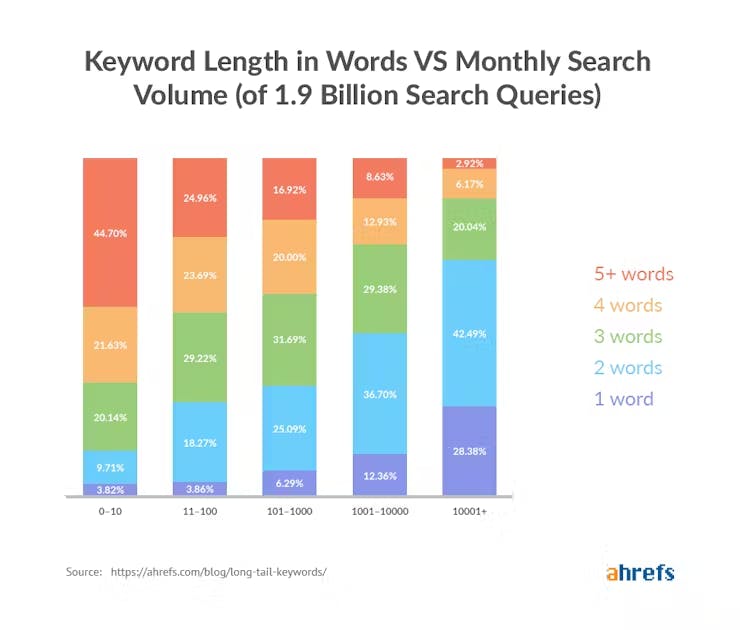
Consider what your target audience may look for on Google and write it down. You don't have to predict specific terms. Just make a list of general ideas.
Don't give it too much thought. Simply write whatever pops up.
Once you have 5–10 ideas or problems, they might be solved with Google searches.
- “How to fix a leaking tap”
- “Best yoga poses for beginners”
- “Affordable digital marketing tools”
2. Create A Preliminary Keyword List
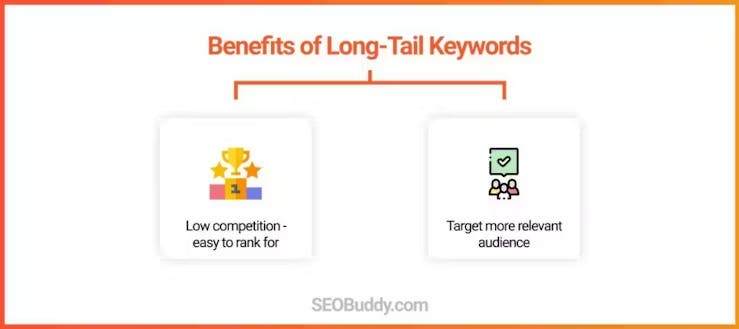
To start SEO keyword research, choose your preferred research tool. We suggest Ahrefs, SEMRush, Google keyword planner, KWFinder.
Type in a competitor’s domain and analyze which keywords they're ranking for. Look at:
- Keyword Difficulty (KD)
- Search Volume
- Traffic Potential
Look for keywords with a KD score between 0–10. These are usually easier to rank for, especially if you’re starting from scratch.
Use filters to focus on relevant topics. Repeat this step for multiple competitors to build a solid list of high-volume, low-competition keywords.
3. Make Your Keyword List Longer
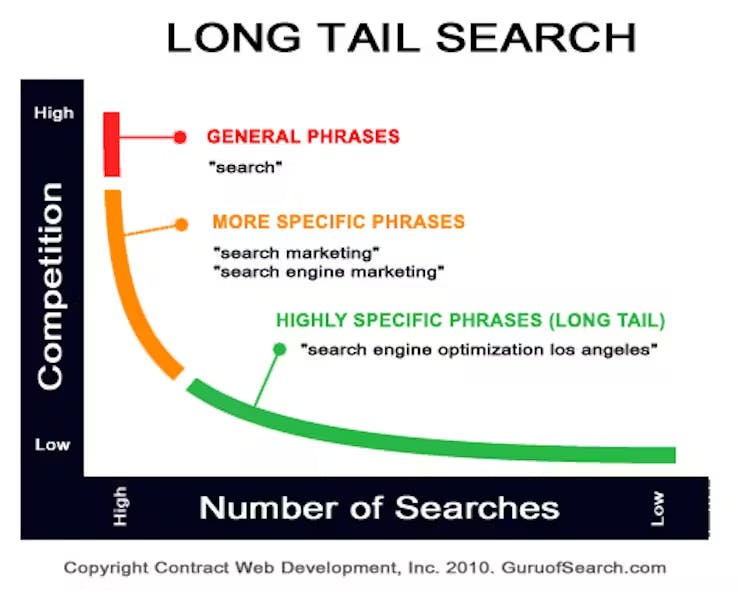
Next, use tools like:
- Seed keywords
- Keyword Magic Tool (by SEMrush)
- AnswerThePublic
- Ubersuggest
.These are excellent for blog posts and informational content.
Tips: Identify question keywords that involve who, what, where, when, why, or how. These are excellent for blog posts and informational content.
Recommend: Top Benefits of SEO for Small Businesses - FavFly
4. Sort High Volume Low Competition Keywords
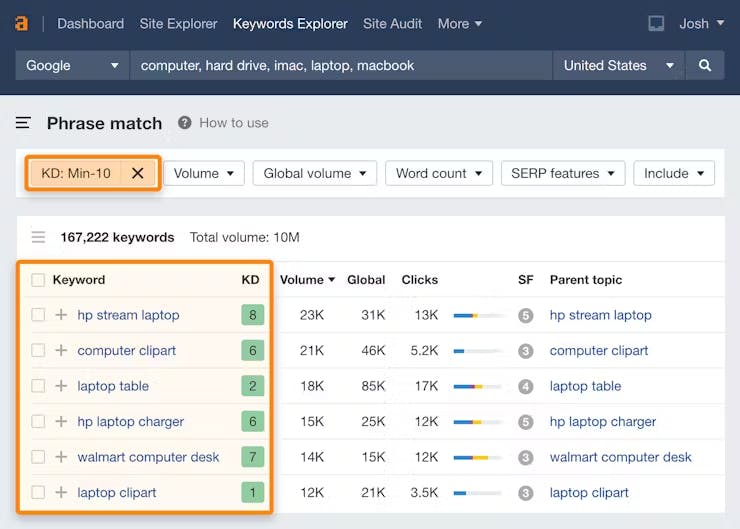
The monthly keyword search volume for each term shows how much traffic you might get. The higher your website ranks for high-volume search phrases, the more visitors it will get.
However, the most popular keywords have a lot of competition. It's pointless to attempt to get a high keyword ranking in SEO because you have no chance.
Therefore, the balance between keyword search volume and SEO keyword competition.
Being an SEO expert in Kolkata, we use two major techniques for filtering out high-competition keywords:
- Keyword Difficulty – determine how tough it would be to outrank the present websites and web pages ranking high for a certain keyword organically.
- SEO Keyword Competition – the number of PPC campaigns that are bidding on a certain search keyword. Although this measure is for sponsored search rivalry, it may also reflect organic search competitiveness.
Use Keyword Gap and Analysis Tools to Discover Missed Opportunities
Once you’ve created your initial list of keywords, it's time to dive deeper using tools like SEMrush’s Keyword Gap tool. These tools help you compare keywords between domains and identify the keywords your competitors rank for, but you don’t. This process reveals powerful keyword opportunities that you might be missing.
To start, enter your domain and a few competitor websites into a keyword gap tool. It will generate a list showing the organic keywords your competitor’s site ranks for, their monthly search volume, and the competition level. This data is gold when trying to identify keywords with lower keyword difficulty and high search volume.
Look specifically for keywords with a lower competition score; these are often the best low competition keywords to target. Not only are they easier to rank for, but they also bring in targeted organic traffic when aligned with user intent.
Free Tools and Tips to Find the Right Keywords
You don’t always need a premium tool to find low competition keywords. Several free keyword research tools and browser plugins can help you identify low-competition keywords. Tools like Ubersuggest, Google Keyword Planner, and Keyword Tool.io offer a decent keyword suggestion tool that lists keywords with low competition, along with estimated search volume.
Start with a list of seed keywords, then refine it by looking for variations with lower search volume and competition. These types of low-competition keywords are easier to rank for, especially if your site is new or still growing.
As you explore, make sure to focus on relevant keywords that align with your content, products, or services. Don’t forget to include your location to your keywords if you're targeting a local audience. This approach will help you find the keywords people use when they type into Google, increasing your chance to rank in organic search results.
Over time, as your site gains authority, you can expand to keywords with the highest search volume. But initially, your goal is to target low competition keywords that bring real value and build your SEO momentum.
Keyword Difficulty Estimation
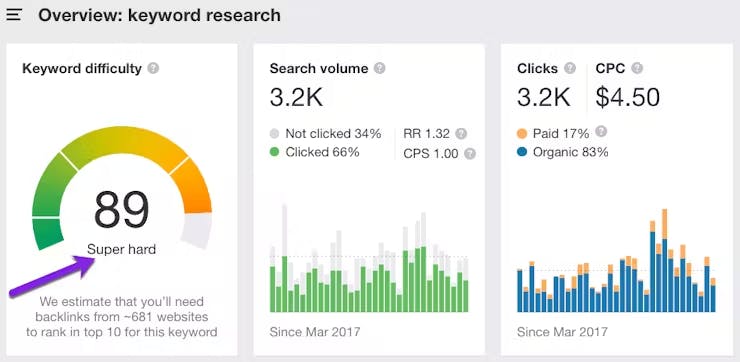
The keyword difficulty shows the labor to overtake your rivals' rankings in the Google top 100 for a certain phrase.
Google employs hundreds of ranking signals. No SEO tool can decode them all and calculate the real keyword difficulty rating. It's impractical and nearly impossible.
It's also crucial to note that each SEO tool has its own algorithm for calculating keyword difficulty. That is why results might vary a lot from one tool to the next.
Keywords with a higher KD score, the more work you'll have to put in.
KD score 80 or over: This segment is the toughest. Before you can join the Google top 20, you'll need to put in a lot of SEO and link-building work, and also time. If you have just launched your website, concentrating on extremely competitive keywords is not a good idea.
KD score 60-79: It’s also difficult to enter Google's top 20 with these keywords. But you can conquer your rivals' rankings after some time. Just focus on developing high-quality content and relevant backlinks.
KD score 40-59: These keywords are achievable to rank if you're just starting.
KD score below 40: Keywords that are the most straightforward to rank for. They have low search volume or extremely particular search intent.
It will take time and effort to figure out how to find low-competition keywords.
Pro Tip: Once you get a decent list of these phrases, use CanIRank to evaluate your actual chances of ranking for each keyword.. Then include the best ones on your site. Thus, you'll have a good chance of ranking well for these high-volume search terms.
Use Google to Find Low Competition Keywords
Aside from paid tools, Google itself is a treasure trove of keyword ideas. Here's how to use it effectively:
1. Google Autocomplete
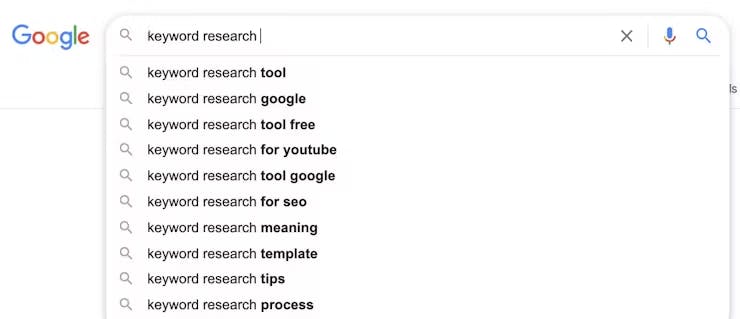
Besides the other research tools, we prefer Google to perform most of the keyword research. The Google Search bar is a great place to find related search queries.
Start typing your topic in the search bar. Note the suggestions; these reflect what real users are searching.
Then, search each suggestion and look at:
- The number of search results
- The type of content ranking
- Whether there’s a gap you can fill
And bingo! You have keywords with low competition that are related to you.
2. People Also Ask Section
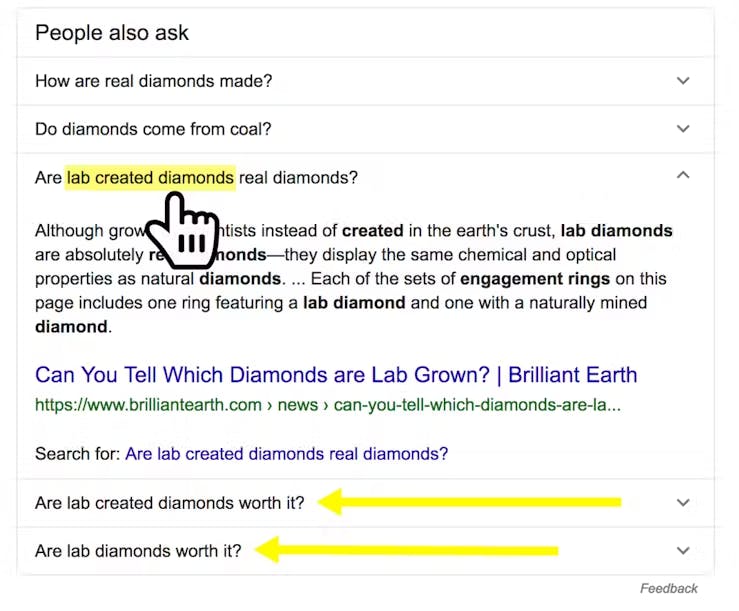
The People Also Ask (PAA) section is another valuable resource for Google keyword research. These questions are Google's way of highlighting different aspects of your search topic.
Continue clicking on the last question in the list to reveal additional related queries in the PAA section. Over time, the questions may become less relevant to your original topic.
Choose the questions you want to include in your keyword list. Then, start fresh with a new keyword and repeat the process.
Make the Most of Your Google Keyword Research

While working as a SEO agency in Kolkata, we found some points that will help you get the most out of the Google keyword research strategy:
- Compete with other online communities: Find queries that are mainly answered by online forums like Quora. It is a smart option for Google keyword research.
- Look at title tags: Locate the differences in the title tags for the same search query. If you can match the search query perfectly in your title tag, you can get your low-competition keyword article ranking.
- Don’t obsess over search volume: Some of your keywords will only get you a few hits each month, while others will bring you thousands. So, don't care about search volume when writing articles. Just focus on producing high-quality material regularly.
- Update your website's content: After a few months or a year, go through your content and update it with any new information useful to the readers. Refreshing the content results in a significant increase in the amount of traffic. Don’t forget to include the revised publication date!
Must Read: Why Local SEO is Important for Your Business Success
Bonus Tip: Look for Featured Snippets
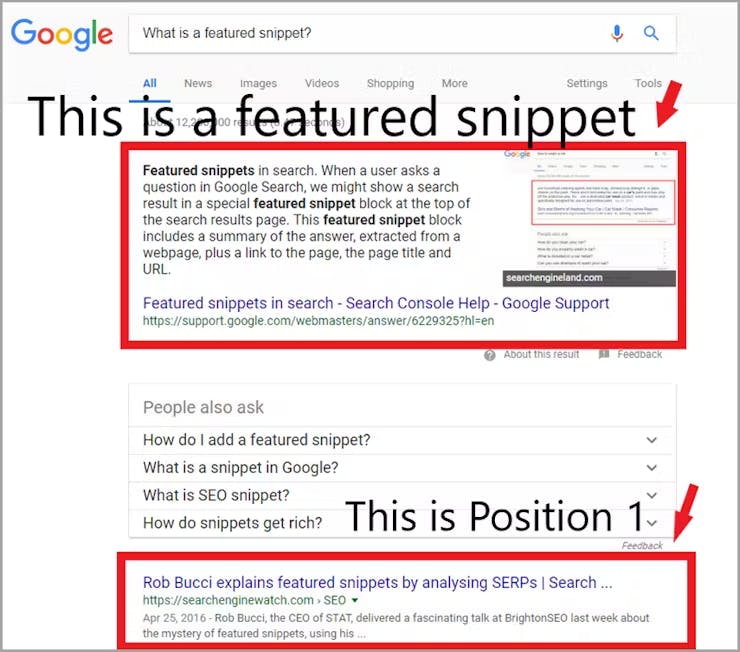
You can also check which keywords activate Featured Snippets.
Featured Snippets (Position Zero) are the boxes that appear at the top of the SERP and provide answers directly.
These are very important for SEO. So, keep track of any term in your strategy that has a Featured Snippet. You can get into the Featured Snippet if you structure the answers correctly.
A low-difficulty term with a Featured Snippet on the SERP is ideal since it allows you to:
- Increase the number of spots at the top of the SERPs.
- Give your readers more information quickly and build trustworthiness.
- This should theoretically be easier to achieve than a high-difficulty keyword.
Pro Tip: Look for keywords that already show snippets but have low competition. These are great targets!
Should you avoid keywords with a lot of competition?

Many individuals stick to low-competition keywords because they believe they can’t rank for anything else. Even if this is true in the near term, high competition keywords are valuable for a variety of reasons.
High competition keywords are still valuable, especially if you’re:
- Trying to attract backlinks
- Building topical authority
- Targeting long-term content strategies
But for newer websites or quicker wins, focus on low competition keywords first. You can expand later.
Conclusion
Knowing how to do keyword research is critical. To accomplish it properly, you just need to be selective in your target selection. A simple Google search yields a wealth of information. So go ahead, get them, and use them to help you drive traffic.
Competition for keywords is a relative term because no keyword difficulty score considers everything that influences competition. Therefore, you should always analyze the top-ranking sites carefully before writing content.
If you don't do this, you risk targeting keywords that aren't actually low competition. Although there is nothing wrong with that, you should target those keywords for the medium to long term rather than the short term.
If you need help, get in touch with the best digital marketing company in Kolkata.
Start Growing in Just 3 Simple Steps
We assess your goals, craft a tailored strategy, and finally implement it so you can confidently grow your business.
Book a free consultationJoin Our WhatsApp Channel
Join our privacy friendly whatsapp channel and stay up to date with the latest news, updates, and exclusive offers. Join our community today!
Get Free AccessSolutions ❇️
Popular Gigs 📈
Tools 🛠️
- Ads Budget Calculator
- UnifyleadsSoon
- ShareUsReviewSoon
- BrandItSoon
- GrowSoon
FavFly Solutions for Your Digital Growth:
SEO Services in Kolkata | Local SEO Company in Kolkata | Digital Marketing Company in Kolkata | Social Media Marketing Services in Kolkata | WebStudio Website Development | UGC Reels Creation Services | Google My Business for Gynecologists | Google My Business for Restaurants | Google My Business Guide | Google My Business for Dentists | Google My Business for Interior Designers | Google My Business for Doctors | How Google My Business Profile Works* About Us : At FavFly, we redefine digital marketing by focusing on what truly matters: your growth. We don’t just offer services like SEO, SMM, and website development – we become an integral part of your success story, providing strategic guidance and innovative solutions that empower your business to reach new heights.










